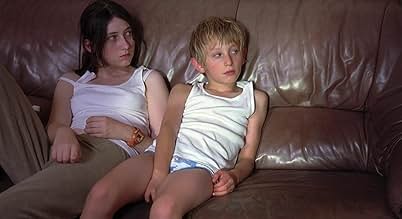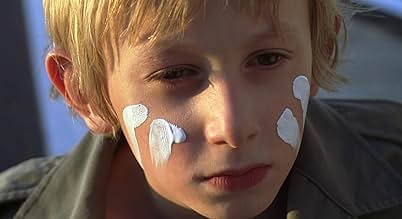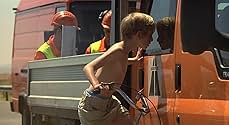Home
- 2008
- Tous publics
- 1h 38min
NOTE IMDb
6,9/10
5,2 k
MA NOTE
Ajouter une intrigue dans votre langueLife for an isolated rural family is upended when a major highway next to their property, constructed 10 years before but apparently abandoned, is finally opened.Life for an isolated rural family is upended when a major highway next to their property, constructed 10 years before but apparently abandoned, is finally opened.Life for an isolated rural family is upended when a major highway next to their property, constructed 10 years before but apparently abandoned, is finally opened.
- Réalisation
- Scénario
- Casting principal
- Récompenses
- 10 victoires et 5 nominations au total
Ivaylo Ivanov
- L'éboueur
- (as Ivailo Ivanov)
Marc Berman
- Radiotauroute
- (voix)
Avis à la une
The World Health Organisation reckons regular night-time noise of more than 45dB can ruin your health. Here's a film that treats a fact of modern life and turns into a "home under attack" movie. It's coming, and you can't stop it.... It's quite clever to have a home-invasion movie where the alien force is nothing more scary than noise and loss of privacy.
Swiss writer-director Ursula Meier backs this tale of modern times with jazz tracks, classical work, and Nina Simone. The music is a diversion from the relentless pressure building on the family as they face up to life next to a Trans-European highway.
Cinematographer Agnès Godard captures the images brilliantly, from the pose Michel strikes on his car roof with the chest freezer that now has to be delivered across the new road, to the line of holiday traffic stretching into the distance in one long bidirectional jam.
Swiss writer-director Ursula Meier backs this tale of modern times with jazz tracks, classical work, and Nina Simone. The music is a diversion from the relentless pressure building on the family as they face up to life next to a Trans-European highway.
Cinematographer Agnès Godard captures the images brilliantly, from the pose Michel strikes on his car roof with the chest freezer that now has to be delivered across the new road, to the line of holiday traffic stretching into the distance in one long bidirectional jam.
Have you ever found yourself wondering about those people who live right alongside the freeway - the anonymous folk whose lives we peer into briefly as we hurtle our way past their apartments and houses en route to our destinations? Well, the artists who made "Home" certainly have, and the answer they've come up with makes for a fascinating, one-of-a-kind cinematic experience that, even more than most movies, has to be seen to be appreciated.
The family in "Home" leads a relatively carefree and decidedly unconventional lifestyle. Their house stands adjacent to an abandoned freeway, which they use as their own private recreation area. They also view bath time as a communal experience (this being Switzerland and all).
All is going reasonably well (despite some mild familial tension here and there), until one day and without any warning, the roadway is reopened to traffic, shattering the family's once-peaceful existence with the sounds of whooshing cars and honking horns, the penetrating odor of exhaust fumes and fossil fuels, a diminution of privacy (especially during traffic jams), and a nonstop assault on the senses. Even getting to the other side of the road – to school or to work – becomes a daily, death-defying game of chicken with speeding vehicles whose drivers have no intention of slowing down for bothersome and unwelcome pedestrians.
This tremendously odd little film is obviously intended as a parable about the oppressiveness and chaos of modern life as it encroaches ever more forcefully onto the peace and tranquility of a rural existence. The family members become increasingly ill-tempered, paranoid, neurotic, even violent as the outside world inexorably presses its way into their once-placid lives.
But far more than the characters and themes, it is the astonishing mise-en-scene that ultimately works its way into the viewer's psyche and that makes it hard not only to avert one's eyes during the course of the movie but to get back to one's own "reality" once it's over. Director Ursula Meier's work here is reminiscent of Luis Bunuel in one of his less playful moods, as she focuses on a group of everyday people trapped in a surrealistic nightmare from which they are unable to awaken. It is definitely a case in which the scene becomes an integral reflection of the psychological states of the characters.
Isabelle Hupert and Olivier Gourmet play the parents; Madeleine Budd and Kacey Mottet Klein their two children; and Adelaide Leroux, Gourmet's nubile daughter from a previous marriage who spends most of her time sunbathing for the highly appreciative motorists and truckers who keep whizzing on by.
Unique and unforgettable.
The family in "Home" leads a relatively carefree and decidedly unconventional lifestyle. Their house stands adjacent to an abandoned freeway, which they use as their own private recreation area. They also view bath time as a communal experience (this being Switzerland and all).
All is going reasonably well (despite some mild familial tension here and there), until one day and without any warning, the roadway is reopened to traffic, shattering the family's once-peaceful existence with the sounds of whooshing cars and honking horns, the penetrating odor of exhaust fumes and fossil fuels, a diminution of privacy (especially during traffic jams), and a nonstop assault on the senses. Even getting to the other side of the road – to school or to work – becomes a daily, death-defying game of chicken with speeding vehicles whose drivers have no intention of slowing down for bothersome and unwelcome pedestrians.
This tremendously odd little film is obviously intended as a parable about the oppressiveness and chaos of modern life as it encroaches ever more forcefully onto the peace and tranquility of a rural existence. The family members become increasingly ill-tempered, paranoid, neurotic, even violent as the outside world inexorably presses its way into their once-placid lives.
But far more than the characters and themes, it is the astonishing mise-en-scene that ultimately works its way into the viewer's psyche and that makes it hard not only to avert one's eyes during the course of the movie but to get back to one's own "reality" once it's over. Director Ursula Meier's work here is reminiscent of Luis Bunuel in one of his less playful moods, as she focuses on a group of everyday people trapped in a surrealistic nightmare from which they are unable to awaken. It is definitely a case in which the scene becomes an integral reflection of the psychological states of the characters.
Isabelle Hupert and Olivier Gourmet play the parents; Madeleine Budd and Kacey Mottet Klein their two children; and Adelaide Leroux, Gourmet's nubile daughter from a previous marriage who spends most of her time sunbathing for the highly appreciative motorists and truckers who keep whizzing on by.
Unique and unforgettable.
Setting up home is the aspiration for most people – a place to unwind with a sense of personal security, and privacy from the outside world. But what happens when this peaceful haven is taken away after ten years of happiness? Marthe & Michel, and their three children, live a fairly idyllic lifestyle, with their home situated next to an abandoned highway that they've converted into their personal playground (son Julien uses it as a bicycle race track, they play games of street hockey, whilst their property's space is extended, using the highway to place furniture, a satellite dish and other items), and only a stone's throw away from beautiful countryside. Though the director takes a fair few liberties with his artistic freedom in setting his one up, he never forgoes realism in its execution, whilst he cleverly handles your uncertainty till the very end. DH
I recently saw this at the 2010 Palm Springs International Film Festival where writer/director Ursula Meier was on hand at my screening for an audience Q&A following the film. Meier explained that she got the idea for the film by seeing a house near a busy highway and letting her imagination run away with what kind of people would live there and the effect of being so close to a highway on them. I think we have all wondered about the inhabitants of homes we've seen while riding in a train or car and seeing homes without freeway barrier walls exposed to the noise of the traffic. In this story a family of five live in home where a major highway has been built running through their front yard. this major thoroughfare was never completely finished or opened to use so it has sat unused for years. The family uses the pavement for their personal use and has all their lawn furniture, etc. on it. One day the family learns the highway will be finished and opened at last and the result has a dramatic effect on their lives. They have lived there for 10 years. The mother has a fear of going out in public, the father is claustrophobic, the oldest daughter wants to escape from her boring existence at the isolated house, the youngest daughter is a mathematics and statistics whiz with an accelerated phobia for toxins and the boy is a pretty normal kid who likes hanging out with his friends. This is a strange and quirky film and pretty good as a debut feature for Meier. It was Switzerland's official submission to the 82nd academy awards for Best foreign Language Film. Some very good films come out of Switzerland but I don't think this warrants a BFLF submission. This may too slow and strange for many so I can't recommend it to a general audience but it's different and I would give it a 6.5 out of 10.
Home is a very strange movie. It is a family with two teenage daughters and one young son living in the middle of a huge golden field of grass. A freeway opens right by the house. It gets noisier. The drivers leer. The drivers honk. The noise becomes non-stop. There is a traffic jam and people get out of their cars and stare. The family cannot deal with this and slowly go mad, cementing up the windows. The little boy is the only sane one in the movie. He handles all this as just so much adventure. One daughter is the sort you love to hate, full of herself, selfish, totally absorbed with her appearance, idle, rude. The other is just plain crazy. Mom and Dad are a very loving caring patient couple. It is a movie where the circumstances gradually deteriorate. I think of Roman Polanski's Repulsion for a similar effect. It is like a horror movie -- unpleasantness for the sake of unpleasantness. There are no murders or zombies, just frayed people who cannot cope with the situation. There is quite a bit of nudity, but I just put that down to a difference in the way the French view nudity within the family. It is not sexual. The ending made no sense to me. It just ended things in mid air without any sort of resolution. The whole movie left me queasy, and wondering if perhaps it were some great metaphor than went right over my head.
Kacey Mottet Klein who plays the little boy Julien is an amazing actor. Not once did I notice he was acting. He was completely believable. In one scene he begged his Mom to let him out of being locked in the bathroom. It was heart-melting. I could not stand that frail little character entombed with the rest of that wacko family.
Kacey Mottet Klein who plays the little boy Julien is an amazing actor. Not once did I notice he was acting. He was completely believable. In one scene he begged his Mom to let him out of being locked in the bathroom. It was heart-melting. I could not stand that frail little character entombed with the rest of that wacko family.
Le saviez-vous
- AnecdotesUrsula Meier has been searching for location for nearly one year, even in Canada. Eventually she found a lost part of a highway in Bulgaria. The house in which the movie plays, was built alongside the highway especially for filming. There were up to 300 drivers "playing" the fast moving cars - all were inhabitants of a nearby village. On days without shooting the drivers came visiting the location with their whole families.
- GaffesAn accident halts the traffic on both sides of the highway. Only one side should be affected: the one leading to where the accident took place.
- ConnexionsFeatured in Women Make Film: A New Road Movie Through Cinema (2018)
Meilleurs choix
Connectez-vous pour évaluer et suivre la liste de favoris afin de recevoir des recommandations personnalisées
- How long is Home?Alimenté par Alexa
Détails
Box-office
- Montant brut aux États-Unis et au Canada
- 15 925 $US
- Week-end de sortie aux États-Unis et au Canada
- 1 403 $US
- 6 déc. 2009
- Montant brut mondial
- 2 186 716 $US
- Durée1 heure 38 minutes
- Couleur
- Mixage
- Rapport de forme
- 1.85 : 1
Contribuer à cette page
Suggérer une modification ou ajouter du contenu manquant

























